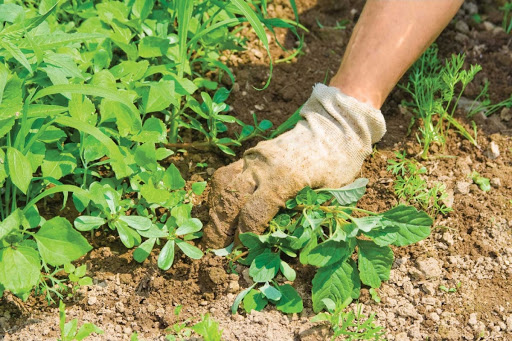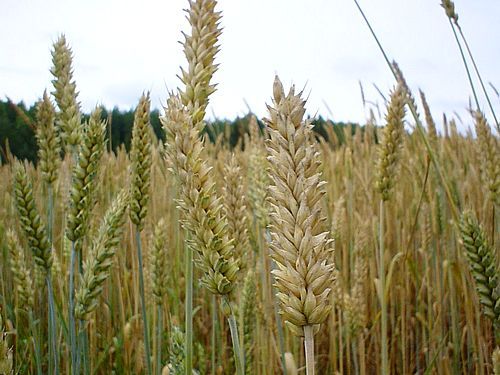a sermon for the Eighth Sunday after Pentecost [Proper 12A/Lectionary 17]
Matthew 13:31-33, 44-52 and Romans 8:26-39
Jesus’ string of parables today reads like one of those children’s riddles, doesn’t it? What do a seed, bread dough, a field, a pearl, and a fish net all have in common? Anybody got a guess?
Each of those things is so different and they don’t seem to be sewn together by any common thread. A seed of a mustard bush, a lump of leaven, a treasure in a field, a pearl of great value, and a net thrown into the sea that catches all kinds of things. Well, here’s a hint: it is something that starts small but grows to have unimaginable impact—it seems like nothing at first but gives shape and substance to everything around it—its discovery brings about a complete reprioritization of values—it involves an imperative sorting out of what is worthwhile and what is useless? Any clue?? Jesus gives the answer to the puzzle: the kingdom of heaven. Each of these things, and each of the scenarios in these parables are, in some way, like the kingdom of heaven.

I like to imagine some of Jesus’ lessons went like that. Kind of fun. Kind of off the wall. One thing we are learning that Jesus is teacher. He spends a good bit of time gathering with crowds and offering lessons and illustrating important topics about God’s Word. I think a lot of us have been thinking about teachers lately, especially as we look at a school year that will be very different from ones anybody has ever known. I follow a few teachers on social media and I can tell that they are going to miss being with their students face to face. So much happens in that interaction in the classroom. In the past some of these teachers have blown me away with their creative lessons and interesting ideas that bring a complicated subject down to a level I can understand. I’m sure trying to figure out how to adapt that kind of energy to an online format is going to be a challenge.

Jesus is a gifted teacher, too, even if he does offer confusing and challenging lessons. He is able to use metaphor and simile with ease, helping his disciples, you and me, step into lesson about very complex subjects, life or death subjects. He is gifted and knowledgeable, and that is going to be important because the kingdom of heaven is a tricky concept. He spends so much time offering lessons about it and trying to explain it because it’s kind of his main point. We may remember: announcing the kingdom of heaven’s arrival is now his whole ministry begins and it quickly becomes the main expectation people have when they encounter Jesus.
But here’s what makes it so challenging: when they hear and discuss “kingdom of heaven” they think of something entirely different from what Jesus intends. They bring to these lessons all kinds of preconceptions about what “kingdom of heaven” means and what it will look like.
One of the things I’ve been doing almost every day for about four months is going to this website where I can check the latest statistics about the spread of the coronavirus. You’ve probably visited a site like it. There are several of them. It lists all of the data by country, and so you can click on “USA” and see the numbers for our country, which are then broken down by state. Although it’s not always peaceful, for the time being it’s pretty convenient that we’re broken down by these geographical regions with defined boundaries and governments, especially at a time like this.

The people Jesus was originally speaking to probably thought of the term kingdom of heaven in that sense. When he came proclaiming repentance for the kingdom of heaven was near, they probably assumed kingdom with boundaries and some kind of government. That’s what King David had had. And King Solomon, the wise. It was something that clearly made sure certain people were in and others were out. It was defensible, you guard it with an army and weapons. You could stand on it and feel safe or proud.
But, as Jesus keeps speaking more and more about the kingdom of heaven and, more significantly, as he starts doing things that are rooted in that kingdom, like healing people and driving out demons, people start to wonder if he is talking about the same thing. It’s like that famous quote from The Princess Bride, when Inigo Montoya confronts Vizzini about his overuse of the word “inconceivable.” Montoya says, “You keep using that word. I do not think it means what you think it means.” Jesus, you keep using that word kingdom of heaven. We do not think it means what you think it means.

So what does Jesus mean? What is this kingdom of God? For Jesus, it is any time and any situation where God’s mercy and peace and freedom rule. It is any place and any scenario where the compassion and the holiness of God make inroads and reign. If a regular worldly kingdom claims us by borders, the kingdom of heaven is wherever and whenever we are claimed by Christ’s love. It is vision God has for all of creation which God intends to make real and lasting. These are, of course, things that Jesus’ people hoped for, but they didn’t realize it was going to be quite as far-reaching. And they probably were expecting a sword to back it up. This vision acts differently from a kingdom or a republic or a sultanate. We experience it differently—with our hearts and souls more than with our feet or passports—and so Jesus will need different illustrations to make it come alive.
Initially we said what all those images have in common is that they are like the kingdom of heaven. But there’s one more thing they have in common: they are all ordinary scenes from first century peasant life. The kingdom embraces first the people at the bottom, the everyday women and men who are not part of the elite, people who work with their hands and don’t have much privilege, people like farmers, fishermen, women who maintain the sourdough starter to feed the family even if they can’t explain the chemistry of how it works.
I’ve long had this theory that if Jesus were speaking today, he’d use Waffle House as a metaphor for God’s kingdom. He’d gather his disciples around a table with some hash browns that are smothered and covered and point out that when he’s in charge all are served equally, out in the open. There are businessmen in suits sitting next to truckers taking a break from the highway sitting next to college kids just finishing a night of partying. There are people just scraping by and people who own their own businesses. Servers and patrons often share stories and joys in an unpretentious way. The place never closes, and in times of natural disaster and suffering it becomes a hub of refuge and nourishment. And no profanity or abusive language is allowed on premises! Do you understand? And all the disciples nod with grits on their chin.

There is an ancient school of thought in church theology, developed by church father named Origen of Alexandria, that says Jesus himself is the kingdom of God. Wherever Jesus is, there is the kingdom. Where his presence is named and honored, there God is reigning, full of justice and love. In a way, each of these images and scenes from the parables is talking about him.
He is like a mustard seed—he seems small and insignificant, but his life will grow and become refuge for people beyond our imagination.
He is like this lump of leaven—a total mystery, but able to add dimension and flavor and bring true life to everything it soaks into.
He is a treasure in a precious field—pure grace. Never earned. Only given and when discovered, worth drastic measure to keep.
He is pearl of great price—enough on his own, and yet still causing us to re-prioritize everything else in our lives in comparison to its value.
He is a dragnet. He is tossed into the world, tossed from a boat, tossed from a cross to pull in absolutely all kinds. Not just those we would choose, but the whole of the world. He is tossed out into the dark, into the pain to bring everything back, and everything will be sorted in us and among us and around us. It all will be filtered according to his grace and love and that which stands in God’s way will be burned away forever. His is a reign which, like branches, like leaven, like the Waffle House empire, eventually extends to every corner and every tucked away backroads highway exit. It will have no boundaries because not even death will keep it in. Not even death will be a border. Not life, nor angels, nor rulers, nor things present, nor things to come nor powers, nor height, nor depth, nor anything else in all creation will be able to separate us from the love of God’s reign.

And even when we’re not seeking him, we will stumble upon him, treasure that he is, outside of the tomb we buried him in. He will be there, tallest of trees, ready for us to make our home within him. He will be there, with bread, asking us to sit down. Maybe for breakfast over waffles and eggs and letting us know and see the grace of his kingdom with our own reborn eyes. And at long last we will understand it means everything he thought it meant.
Thanks be to God!

The Reverend Phillip W. Martin, Jr.





